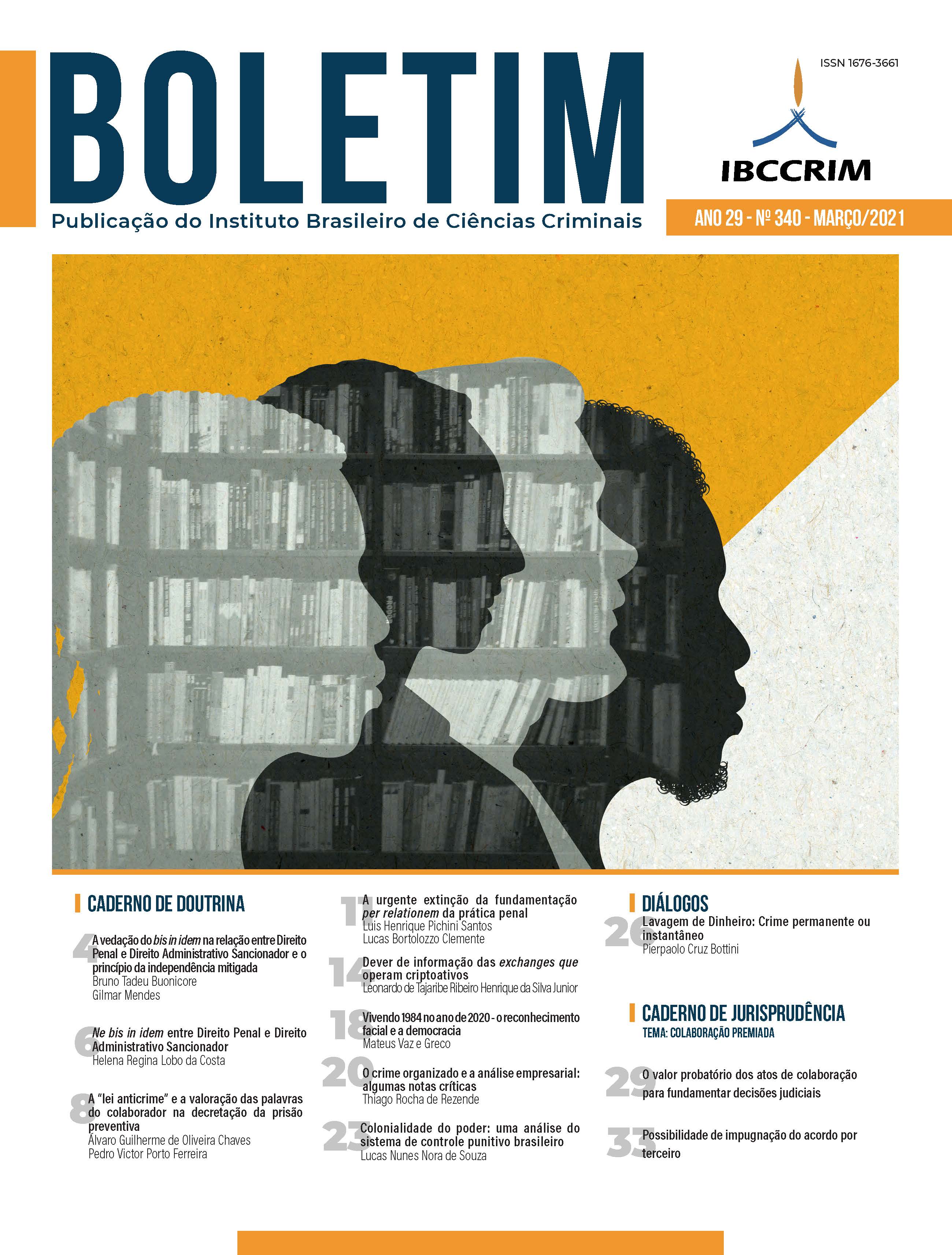Money laundering:
permanent or instantaneous crime?
Keywords:
money laundering, legal nature, instantaneous or permanent, crime against the administration of justiceAbstract
The purpose of this paper is to examine the legal nature of the crime of money laundering, considering its classification as a permanent or instantaneous crime. Such a distinction has several practical consequences for, for example, counting the statute of limitations, the impact of the law on time, the possibility of arrest in flagrant. As a rule, the instant nature of the crime of money laundering, considering the administration of justice as the legal asset protected by the norm, is the most appropriate, except in cases of custody or having illegal products in deposit. The act of participating in a group, provided for in Article 1, § 2 of Law 9.613 / 98, may be permanent or instantaneous.
Downloads
References
Roxin, Claus. Derecho Penal. Parte General. 2. ed. Madrid: Thompson/Civitas, p. 329. Para Miguel Reale Jr., os crimes permanentes são aqueles nos quais a situação lesiva perdura no tempo, protraindo-se a situação antijurídica, com o aumento do prejuízo originado pelo fato. (REALE JR., Miguel. Instituições de direito penal: parte geral. 4. ed. Rio de Janeiro: Forense, 2013, p. 270.).
Santos, Juarez Cirino. Manual de direito penal. Parte Geral. São Paulo: Conceito, 2011, p. 55.
BRASIL. Supremo Tribunal Federal (2. Turma). HC 76678, Relator Min. Maurício Correa j. 29.06.98; BRASIL. Superior Tribunal de Justiça (5. Turma). REsp 900509. Ocultação de cadáver. Delito permanente. Prisão preventiva. Fundamentação. Ausência de pré-questionamento (...). Relator: Min. Felix Fischer, 26 ago. 2007. Disponível em: https://processo.stj.jus.br/processo/revista/documento/mediado/?componente=ITA&sequencial=704009&num_registro=200602245931&data=20070827&peticao_numero=-1&formato=PDF. Acesso em: 14 fev. 2021.
BRASIL. Superior Tribuna de Justiça (5. Turma). HC 28837. Relator: Min. Felix Fischer, j. 10.05.2004.
BRASIL. Superior Tribunal de Justiça (6. Turma). HC 19434. Relator: Min. Hamilton Carvalhido, j. 19.12.2002. No mesmo sentido, MIRABETE, Julio Fabrini; Fabbrini, Renato N. Código Penal Interpretado. 5. ed. São Paulo: Atlas, 2015, p. 1260.
BRASIL. Supremo Tribunal Federal (1. Turma). Apn 863/SP, Relator Min. Edson Fachin, j. em 23.05.2017. No mesmo sentido, MAIA, R. T. Lavagem de dinheiro. São Paulo: Malheiros, 1999, p. 84; BONFIM, M. M. M.; BONFIM, E. M. Lavagem de dinheiro. 2. ed. São Paulo: Malheiros, 2008, p. 47; BARROS, M. A. de B. Lavagem de capitais e obrigações civis correlatas. 3. ed. São Paulo: Revista dos Tribunais, 2012, p. 63; CARLI, C. V. de . Dos crimes: aspectos objetivos. In CARLI, C.V. de (org). Lavagem de Dinhiero: prevenção e controle. 1. Ed. Porto Alegre: Verbo Jurídico, 2012 p. 198, NUCCI, Guilherme de Souza. Leis penais especiais 1, 2011, p. 829.
ROXIN, Claus. Derecho Penal. Parte General. 2. ed. Madrid: Thomson/Civitas, 2006, p. 331. t. I.
Downloads
Published
How to Cite
Issue
Section
License
Copyright of published articles belongs to the author, but with journal rights over the first publication and respecting the one-year exclusivity period. Authors may only use the same results in other publications by clearly indicating this journal as the medium of the original publication. If there is no such indication, it will be considered a situation of self-plagiarism.
Therefore, the reproduction, total or partial, of the articles published here is subject to the express mention of the origin of its publication in this journal, citing the volume and number of this publication. For legal purposes, the source of the original publication must be consigned, in addition to the DOI link for cross-reference (if any).








